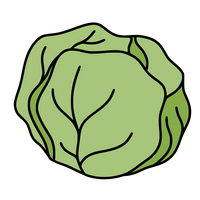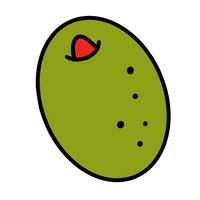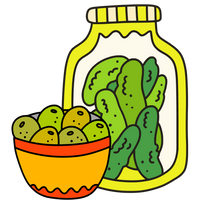
We get a lot of questions about our process, starting with the name. Lactic acid bacteria is the type of good bacteria that results from the process-- hence the name. 'Lactic-acid fermentation' is shortened to lacto-fermentation which is again shortened to simply 'fermentation.' Here’s the Top 7 list of the basic questions we get about the process, its results and fermented pickles:

Are All Pickles Equally Healthy?
How a pickle is made determines whether or not it is a probiotic-rich superfood or simply a salty snack. It’s lacto-fermentation, and not pickling, that creates the live, raw, probiotic-rich pickles that are so full of health benefits. What’s the difference? Most pickles on supermarket shelves contain vinegar or sugar. Lacto fermentation uses only salt-water brine, plus a few other core elements described in The 4 Keys to Success When Fermenting to achieve its live, raw, probiotic-rich status. Pickles containing vinegar or sugar will be too acidic for probiotics to flourish and live. They may taste great, but they’re not fermented and they’re definitely not probiotic.
Are Naturally Fermented Pickles a New Innovation? Why Am I Suddenly Hearing All About Them?
The current popularity of fermented foods and probiotics might lead one to think this is a new hot trend or fad. Not so. Cultures spanning the globe used fermentation methods to preserve food, dating back thousands of years. When electricity and industrialization emerged, the long-standing tradition of fermentation fell by the wayside. Recent scientific findings of probiotic health benefits are so amazing that the mainstream media deems them newsworthy, reporting them to the public. This has created a class of enlightened consumers actively seeking out fermented and probiotic-rich foods at farmer’s markets and in stores.
Is There Any Milk In Fermented Foods? What’s the word ‘Lacto’ Referring To?
The word ‘lacto’ in lacto fermentation creates the misconception that there is milk or dairy products in pickles. This is not the case. The ‘lacto’ is short for ‘lactic acid bacteria,’ the specific type of good bacteria—or probiotic—that is created in the fermentation process. While there are some fermentation traditions that utilize milk-whey as a starter culture (for example beet kvass from Slavic traditions) there is absolutely no dairy in lacto-fermented food.
Can I really make homemade fermented pickles myself?
Heck yeah! But it may be trickier than you think. Attempting a DIY batch of fermented pickles pretty straightforward and although it’s a simple, “low-tech” process that anyone can master, it’s not always easy to achieve reliable and consistent results when lacto-fermenting. There remains some mystery around the process, which is often aptly described to be as much of an art as a science. The process can be incredibly varied—small differences in temperature, time and salt content will alter a batch’s flavor, texture and composition. Batch variance remains the biggest challenge for any small food fermentation company, including our own.
Are Fermented Pickles Safe To Eat?
This is a common question, because fermented pickles are not pasteurized. Pasteurization is the process of heating food to above 144 F to kill any and all bacteria within—the good and the bad. Pasteurizing fermented and probiotic vegetables would destroy their probiotics, rendering them what some call a ‘dead’ food. Lactic-acid bacteria are also considered non-toxic, food-grade microorganisms, and most of them have what’s called GRAS status from the FDA, which stands for ‘generally recognized as safe.
Why Are Fermented Pickles So Much Healthier?
Fermentation is a unique method that creates live, good bacteria called probiotics in its process. We go into much more detail about exactly how this happens when in our article The 3 Phases that Create Probiotics During Lacto-Fermentation. Probiotics, defined as bacterial organisms that confer health benefits to its host, are absolutely essential to great health because they support your gut. But knowing that is just the beginning of understanding it all. Your gut—as recent research has found and continues to discover—is responsible for so much more than just your digestion and elimination. In fact, there is evidence to support the claim that your gut and its microbiome within may be a near- equal partner to your brain as the command center in your body.
What’s the Connection Between Fermented Foods, Probiotics and the Microbiome?
Within each of us, lives a colony of cellular, bacterial, microorganisms so plentiful in mass that its weight (which is about three pounds) is equal to that of our brain. Its cell count is so vast, that it amazingly comprises 90% of the cells in our body, with only the remaining 10% being human cells. This colony is your body’s microbiome and the BEST thing you can feed your microbiome to optimize its health (and therefore your own) is probiotic-rich, whole foods like pickles, sauerkraut and kimchi. Keep reading and learning about gut health in our article What is My Microbiome?












